Find Help
More Items From Ergsy search
-
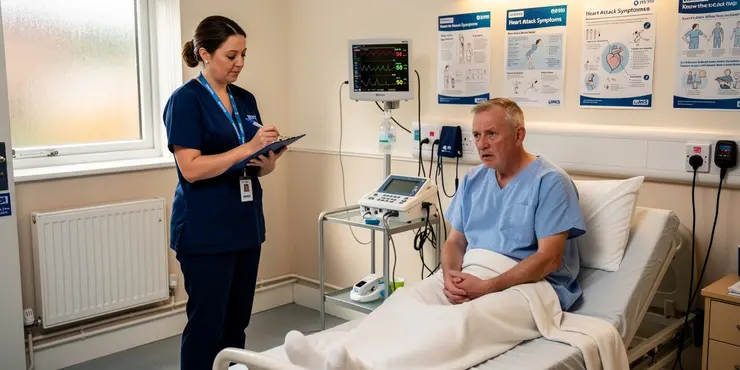
How long do heart attack symptoms last?
Relevance: 100%
-
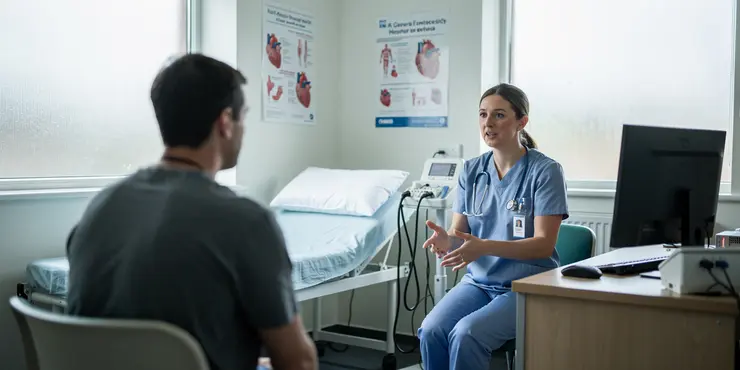
Are heart attack symptoms different for people with diabetes?
Relevance: 99%
-
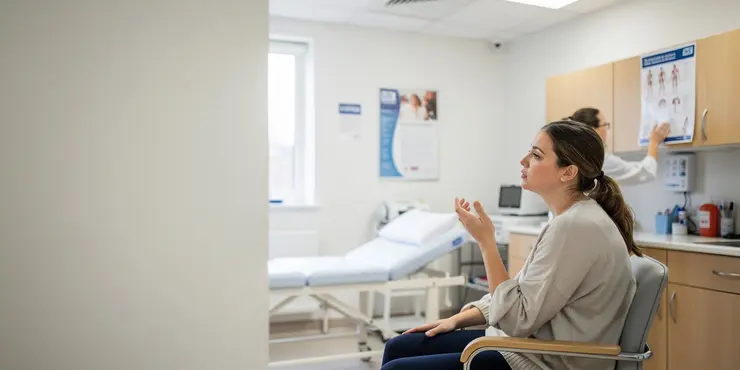
Can heart attack symptoms vary by age?
Relevance: 99%
-
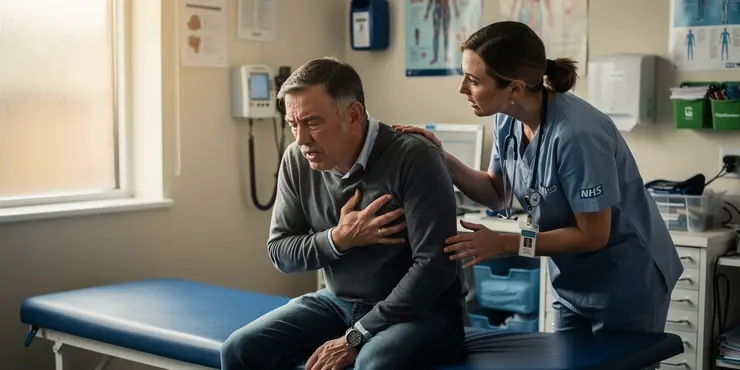
What should I do if I'm experiencing heart attack symptoms?
Relevance: 98%
-
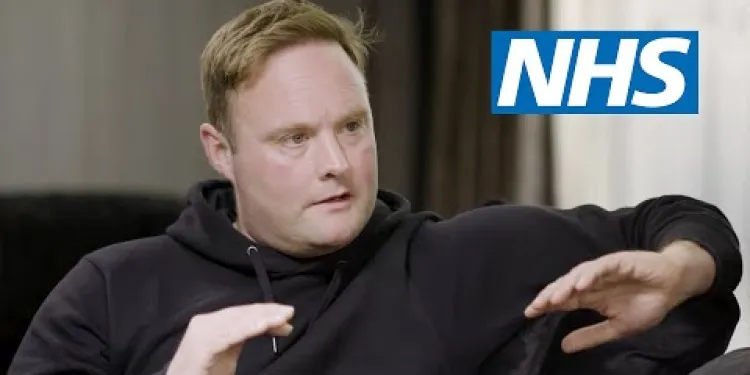
Heart Attack Symptoms - Peter Dale (Tubes) | NHS
Relevance: 96%
-
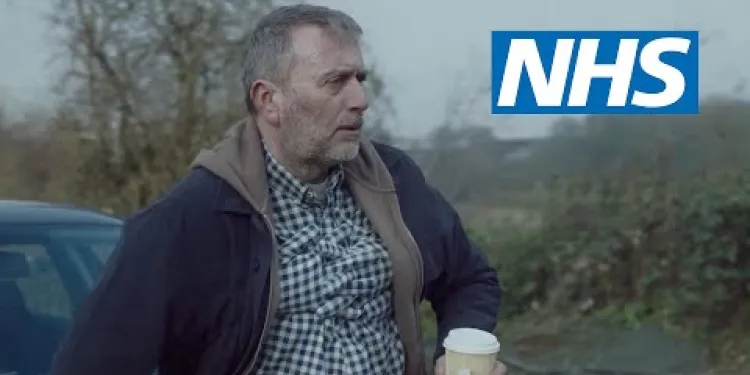
Heart Attack Symptoms - Help Us Help You | NHS
Relevance: 95%
-
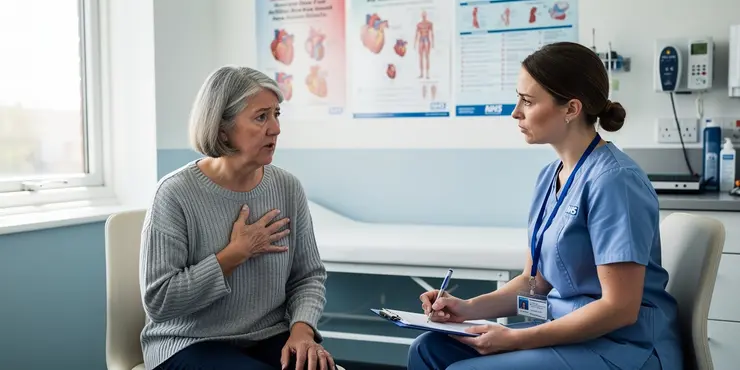
Can women have different heart attack symptoms than men?
Relevance: 91%
-
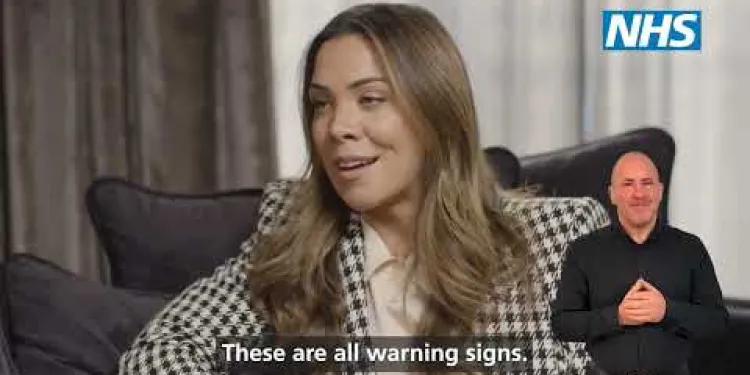
Heart Attack Symptoms - Peter Dale (Tubes) | NHS - BSL version
Relevance: 90%
-
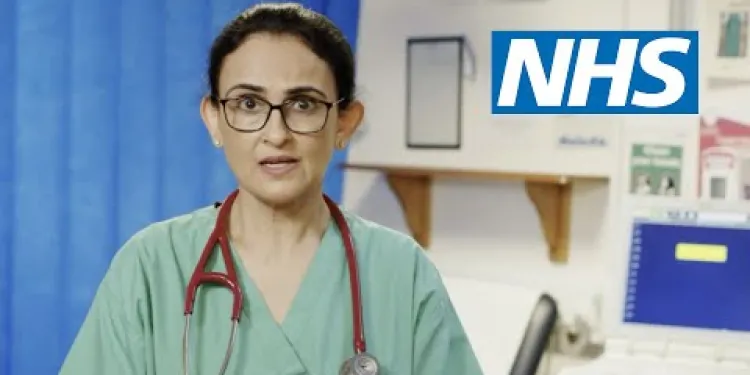
Heart Attack Stories | NHS
Relevance: 90%
-
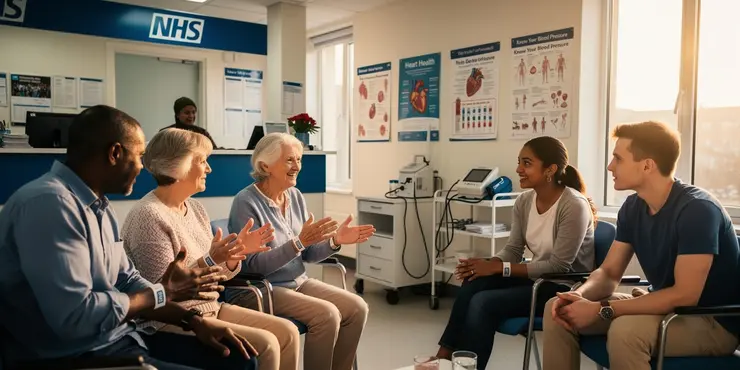
Heart Attack Stories | NHS
Relevance: 89%
-
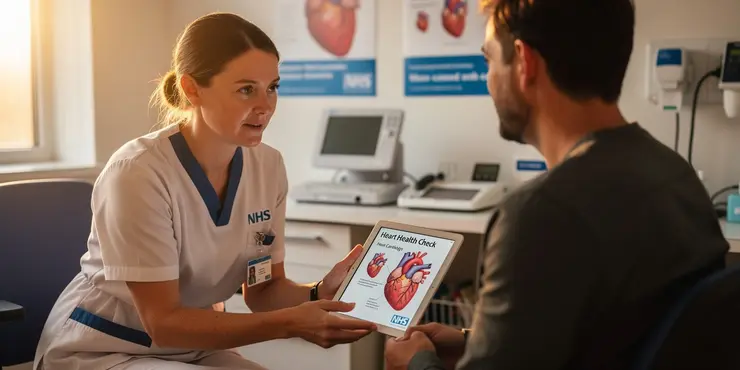
Is it possible to prevent a heart attack?
Relevance: 82%
-
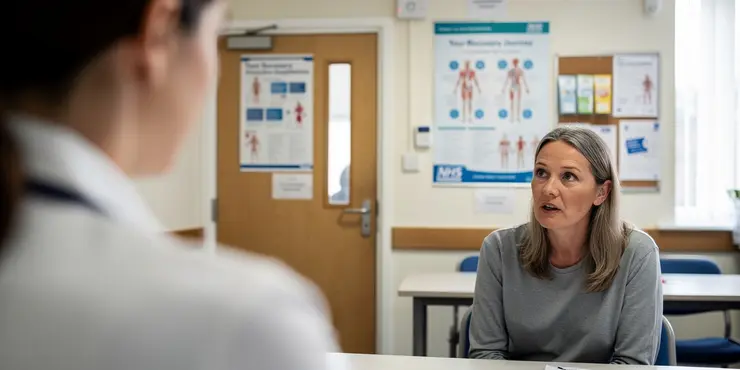
What are the long-term effects of a heart attack?
Relevance: 82%
-
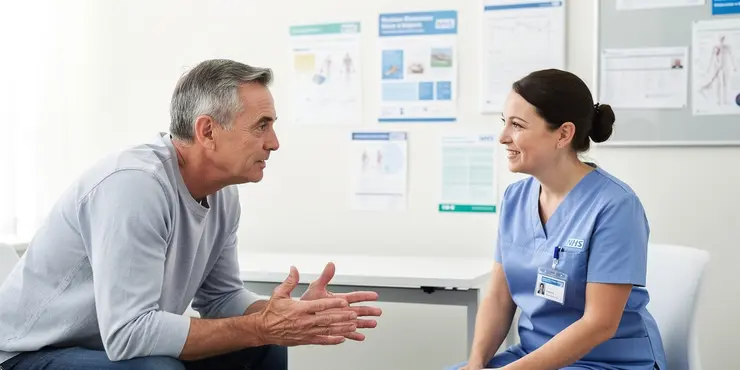
Is it possible to have a heart attack without chest pain?
Relevance: 82%
-
How can I differentiate between heartburn and a heart attack?
Relevance: 80%
-
What are the risk factors for a heart attack?
Relevance: 79%
-
Can physical exertion trigger a heart attack?
Relevance: 76%
-
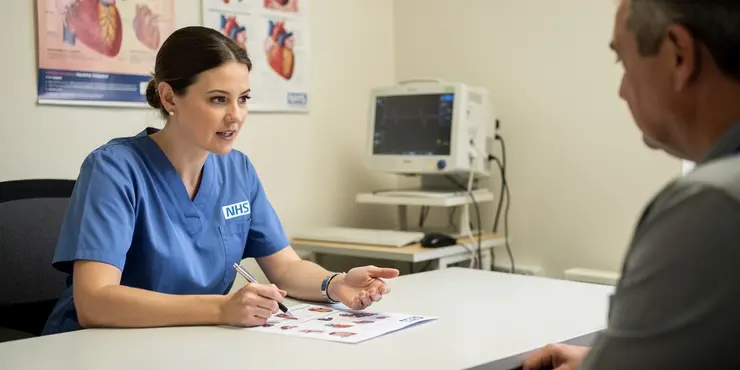
How do beta-blockers contribute to heart attack prevention?
Relevance: 75%
-
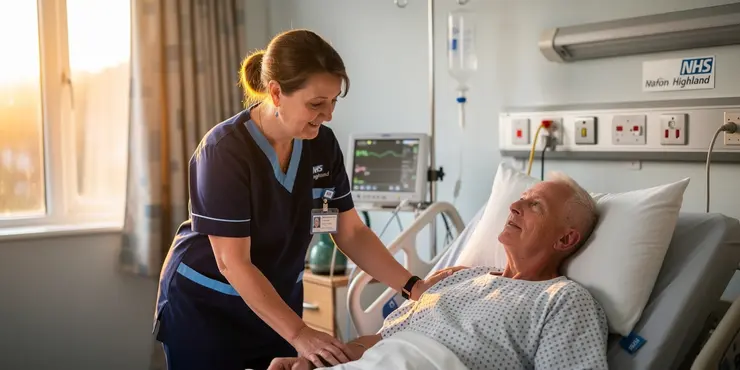
Heart attack care - Raigmore Hospital Inverness, NHS Highland
Relevance: 74%
-
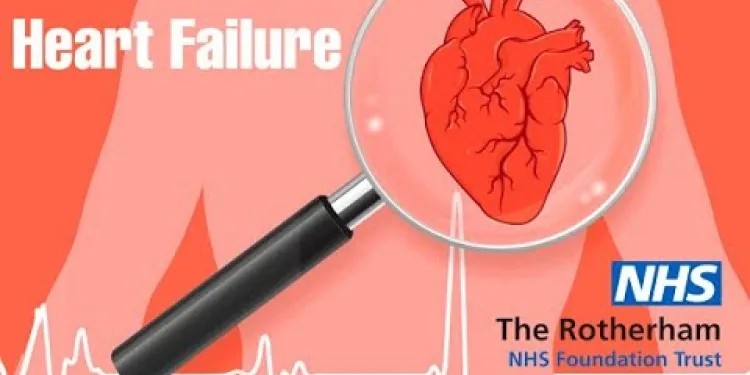
Heart Failure : Symptoms of heart failure
Relevance: 72%
-
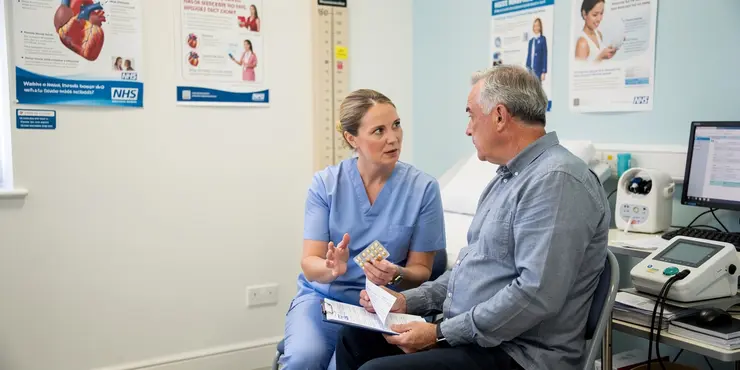
Do calcium channel blockers help in preventing heart attacks?
Relevance: 71%
-
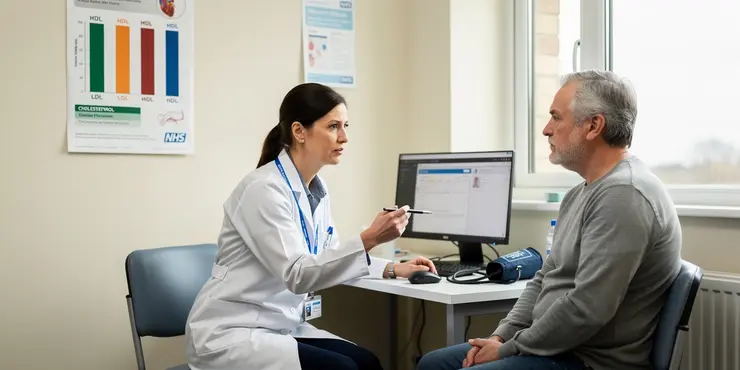
What drugs are commonly prescribed to reduce the risk of heart attacks?
Relevance: 71%
-
Do over-the-counter medications help in preventing heart attacks and strokes?
Relevance: 71%
-
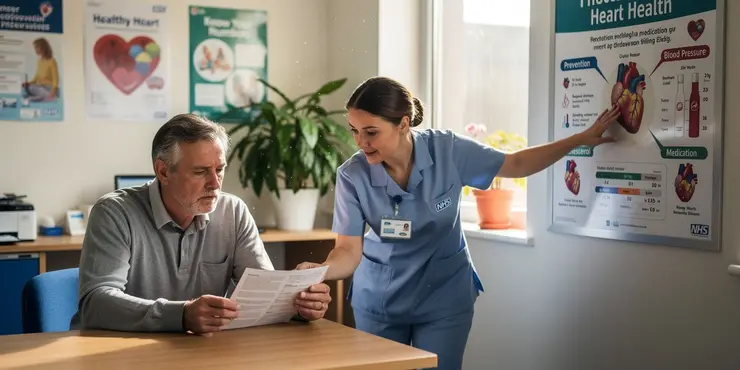
When should one start taking medication for heart attack prevention?
Relevance: 70%
-
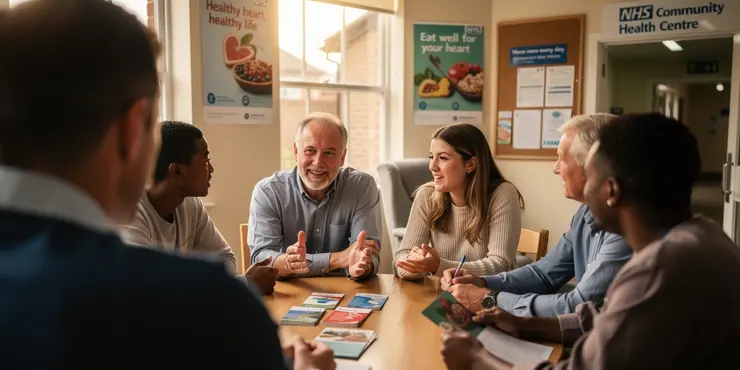
What is the role of lifestyle modification in heart attack and stroke prevention?
Relevance: 69%
-
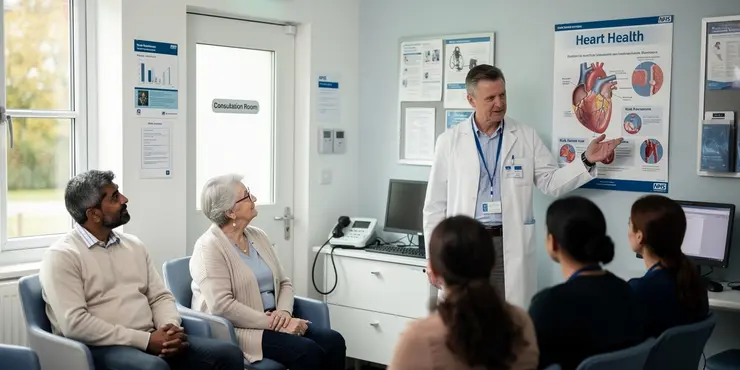
Do all patients need medication to prevent heart attacks and strokes?
Relevance: 68%
-
What is the role of PCSK9 inhibitors in heart attack prevention?
Relevance: 67%
-
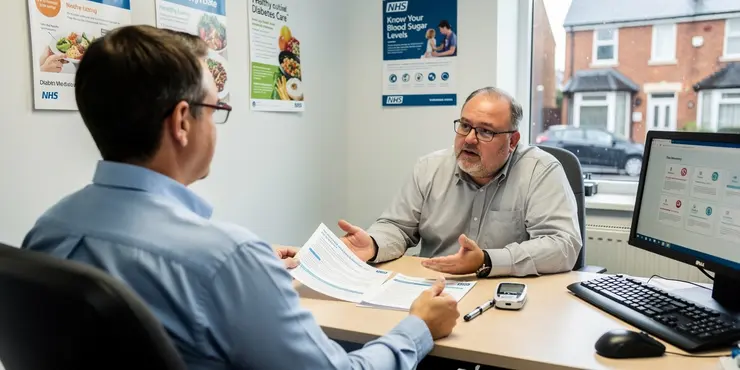
Can diabetes medications also help reduce heart attack risk?
Relevance: 65%
-

Heart Failure : When the heart becomes stiff?
Relevance: 59%
-
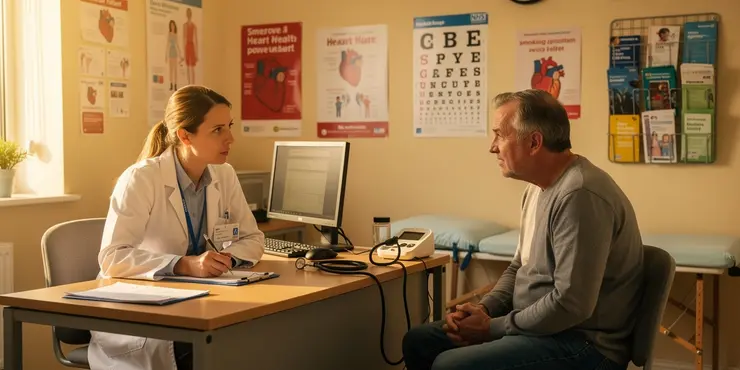
What should I do if I experience symptoms of heart failure?
Relevance: 58%
-

Heart Failure : The normal heart
Relevance: 57%
-
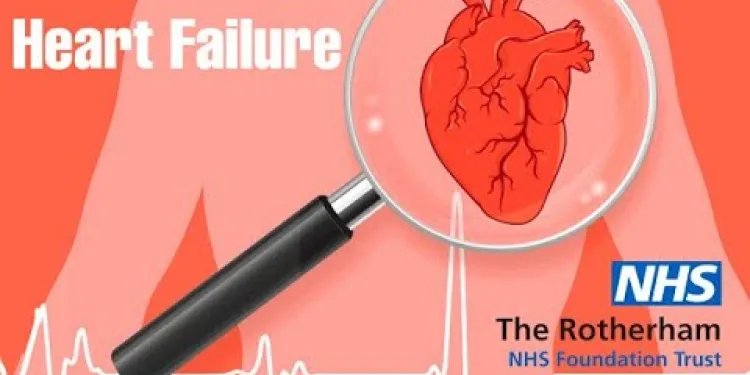
Heart Failure : What is heart failure?
Relevance: 56%
-
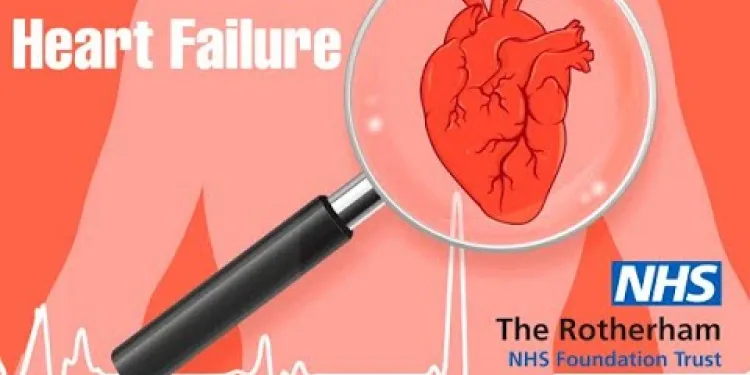
Heart Failure : Heart failure that cannot pump
Relevance: 56%
-
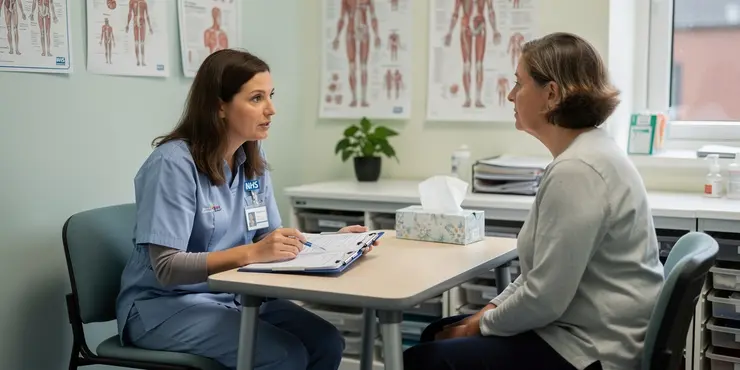
Can anxiety cause heart attack-like symptoms?
Relevance: 54%
-

BSL - How to deal with panic attacks
Relevance: 54%
-
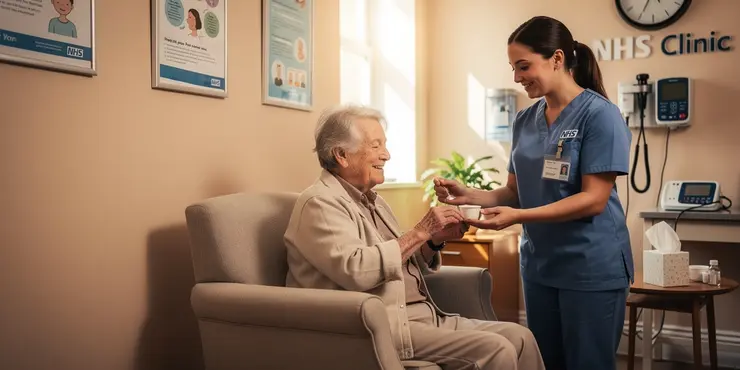
Medicines of the heart
Relevance: 54%
-

What are the most common symptoms of a heart attack?
Relevance: 54%
-
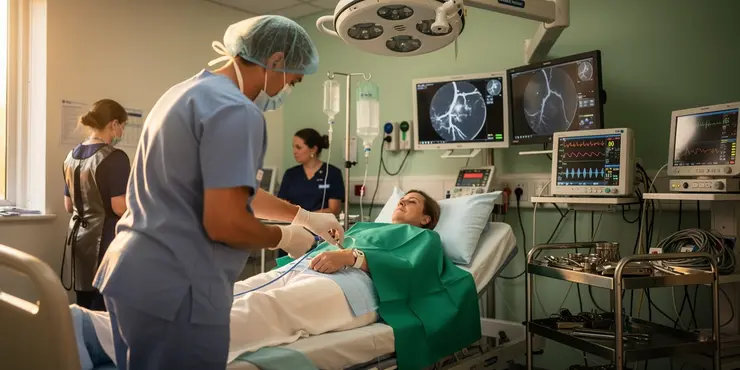
Heart stents
Relevance: 53%
-
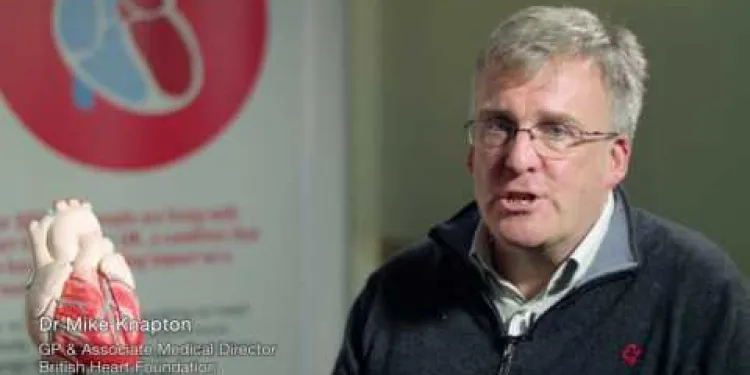
Heart failure introduction
Relevance: 53%
-
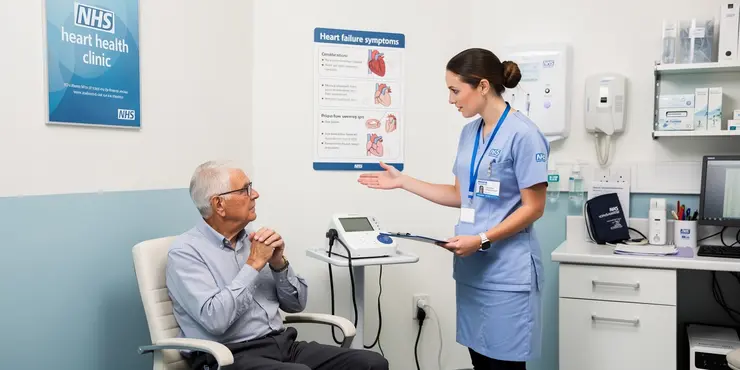
How is heart failure diagnosed?
Relevance: 51%
-
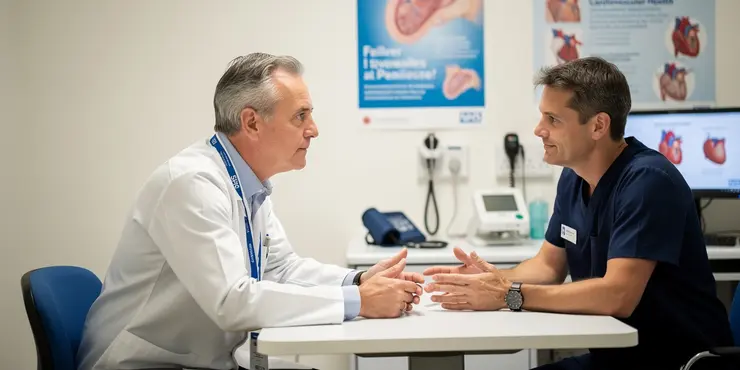
Are there different types of heart failure?
Relevance: 51%
Heart Attack Symptoms - Help Us Help You | NHS
Introduction
Heart attacks are a serious medical emergency, and recognizing the symptoms early can be crucial for ensuring prompt and effective treatment. The National Health Service (NHS) emphasizes the importance of being aware of the signs to help save lives. In the UK, understanding these symptoms can facilitate quicker intervention and better outcomes for patients.
Common Symptoms
It is essential to be knowledgeable about the most common heart attack symptoms. These can include:
- Chest Pain: A sensation of pressure, tightness, or squeezing in the centre of your chest. This pain may spread to your arms, neck, jaw, back, or stomach.
- Shortness of Breath: Difficulty in breathing even while resting or with minimal physical activity.
- Sweating: Experiencing sudden, cold sweats without any apparent reason.
- Nausea or Vomiting: Feeling sick without any obvious cause.
Less Common Symptoms
Some heart attack symptoms are less well-known but equally important. These may include:
- Fatigue: Unusual or extreme tiredness, sometimes lasting for days, can be a warning sign, especially for women.
- Indigestion or Heartburn: A feeling of severe indigestion or heartburn.
- Light-headedness or Dizziness: Feeling light-headed or dizzy, which may be accompanied by a sense of impending doom.
What to Do in an Emergency
If you or someone else shows symptoms of a heart attack, it is crucial to act quickly:
- Call 999 immediately for an ambulance.
- While waiting for medical help, chew and swallow a 300mg aspirin, if available (unless allergic or advised otherwise by a healthcare professional).
- Stay calm and try to rest in a comfortable position, ideally sitting up to ease pressure on the heart.
Prevention Tips
Though not all heart attacks can be prevented, certain lifestyle changes can reduce risk factors:
- Maintain a healthy diet low in saturated fats and high in fruits and vegetables.
- Engage in regular physical activity.
- Avoid smoking and limit alcohol consumption.
- Manage stress through relaxation techniques and adequate sleep.
- Regularly monitor and manage blood pressure, cholesterol levels, and diabetes if applicable.
Conclusion
Recognizing the early symptoms of a heart attack and taking prompt action can save lives. The NHS encourages everyone in the UK to be aware of these signs and to seek immediate medical help if a heart attack is suspected. Through education and awareness, we can help ensure better outcomes for heart attack patients.
Heart Attack Symptoms - Help Us Help You | NHS
What is a Heart Attack?
A heart attack is very serious. It happens when the blood can't reach the heart. Knowing the symptoms is important. This helps get treatment quickly and can save lives. The NHS wants you to know these signs.
Common Symptoms
These are some common signs of a heart attack. Look out for them:
- Chest Pain: It feels like there is a lot of pressure or tightness in your chest. The pain might go to your arms, neck, jaw, back, or stomach.
- Shortness of Breath: You might have a hard time breathing, even if you are not moving much.
- Sweating: You might start sweating a lot suddenly, and there is no clear reason why.
- Nausea or Vomiting: Feeling sick in your stomach or throwing up.
Less Common Symptoms
There are other signs that people might not know about. They are important too:
- Fatigue: Feeling very tired for no clear reason. This can happen a lot in women.
- Indigestion or Heartburn: Feeling like your stomach is very upset or burning.
- Light-headedness or Dizziness: Feeling like you might faint. You might also feel very scared.
What to Do in an Emergency
If you see these signs in yourself or someone else, act fast:
- Call 999 right away to get an ambulance.
- While waiting, chew and swallow a 300mg aspirin, if you have one (don't do this if you're allergic or a doctor told you not to).
- Stay calm. Sit in a position that feels comfortable and helps you breathe better, like sitting up.
How to Help Prevent a Heart Attack
You can do some things to lower the chance of a heart attack:
- Eat healthy foods with lots of fruits and vegetables, and avoid foods with a lot of fat.
- Exercise regularly to stay fit.
- Do not smoke, and do not drink too much alcohol.
- Find ways to relax and get enough sleep to reduce stress.
- Keep an eye on your blood pressure, cholesterol, and blood sugar (if you have diabetes).
Conclusion
Knowing the symptoms of a heart attack can save lives. If you think someone is having a heart attack, get medical help fast. The NHS wants everyone to learn these signs so they can get help quickly and improve the chances of getting better.
Frequently Asked Questions
What are the most common symptoms of a heart attack?
Common symptoms include chest pain or discomfort, pain in other parts of the body such as the arms, back, neck, or jaw, shortness of breath, feeling weak, lightheaded, or faint, and anxiety.
Is chest pain always a sign of a heart attack?
While chest pain is a common symptom, not all chest pain is related to a heart attack. However, if you experience unexplained chest pain, you should seek medical attention immediately.
Can women have different heart attack symptoms than men?
Yes, women may experience symptoms such as nausea, vomiting, and back or jaw pain in addition to chest discomfort. They are also more likely to have symptoms that are atypical or less severe.
What should I do if I'm experiencing heart attack symptoms?
Dial 999 immediately and ask for an ambulance. Do not drive yourself to the hospital. It is critical to get medical help as quickly as possible.
Are there any early warning signs of a heart attack?
Some people may experience mild symptoms such as chest discomfort that comes and goes, shortness of breath, and fatigue in the days or weeks leading up to a heart attack.
How can I differentiate between heartburn and a heart attack?
Heartburn typically causes a burning sensation in the chest that may be relieved by antacids. Heart attack pain is usually more intense, lasts longer, and can come with other symptoms like shortness of breath.
Is it possible to have a heart attack without chest pain?
Yes, some people, especially women and older adults, may have a heart attack without chest pain. Other symptoms like shortness of breath, nausea, or discomfort in other areas may be present.
Can anxiety cause heart attack-like symptoms?
Yes, anxiety and panic attacks can mimic heart attack symptoms, including chest pain, shortness of breath, and palpitations. However, any new or unexplained symptoms should be evaluated by a healthcare professional.
What are the risk factors for a heart attack?
Risk factors include smoking, high blood pressure, high cholesterol, diabetes, obesity, a sedentary lifestyle, and a family history of heart disease.
Are heart attack symptoms different for people with diabetes?
People with diabetes may experience less obvious symptoms such as fatigue, difficulty breathing, or discomfort in the shoulders, back, or jaw rather than classic chest pain.
Can heart attack symptoms vary by age?
Yes, older adults may have subtler symptoms like shortness of breath, dizziness, or fatigue instead of the typical crushing chest pain.
How long do heart attack symptoms last?
Heart attack symptoms typically last for more than a few minutes and don’t usually go away with rest. Symptoms may come and go but should be taken seriously and require immediate medical attention.
Can physical exertion trigger a heart attack?
Yes, physical exertion, especially for those with underlying heart disease, can trigger a heart attack. It's important to consult with a healthcare provider before engaging in strenuous activities.
What are the long-term effects of a heart attack?
The long-term effects can vary but may include heart failure, arrhythmias, and an increased risk for another heart attack. Early and effective treatment can improve outcomes.
Is it possible to prevent a heart attack?
Many heart attacks can be prevented by adopting a healthy lifestyle, such as eating a balanced diet, exercising regularly, quitting smoking, and managing conditions like high blood pressure and diabetes.
What are the signs of a heart attack?
A heart attack is when your heart gets hurt and needs help. Here are signs that someone might be having a heart attack:
- Chest pain or feeling like your chest is being squeezed.
- Pain in your arms, back, neck, or jaw.
- Feeling out of breath or having trouble breathing.
- Feeling sick to your stomach.
- Feeling really tired or sweaty.
If you or someone else have these signs, tell an adult or call for help right away. It's important to get help fast.
You can use pictures or videos to help understand what a heart attack is. Ask someone you trust to explain more if you are not sure.
Some things you might feel if you are not well:
- Your chest might hurt or feel uncomfortable.
- You might feel pain in your arms, back, neck, or jaw.
- You might have trouble breathing.
- You might feel weak, dizzy, or like you will faint.
- You might feel worried or anxious.
If you feel these things, tell an adult you trust or a doctor.
Some things that might help you:
- Take slow, deep breaths to help with shortness of breath or anxiety.
- Sit or lie down if you feel lightheaded or faint.
- Ask someone to stay with you so you are not alone.
Does chest pain mean a heart attack?
Chest pain can be scary. It might feel like something is wrong with your heart. But chest pain doesn't always mean a heart attack.
Sometimes, chest pain can be from things like:
- Heartburn
- Muscle strain
- Stress or worry
- Breathing problems
If you have chest pain, it's important to tell an adult. They can help you see a doctor.
Here are some things that can help:
- Talk about your feelings
- Take deep breaths
- Rest
- Ask for help
Always check with a doctor to be sure.
Lots of people feel pain in their chest. It doesn’t always mean you’re having a heart attack. But if your chest hurts and you don’t know why, it’s important to see a doctor right away.
Do women feel heart attacks differently than men?
Yes, women can feel sick, throw up, and have pain in their back or jaw. They also may have different or milder signs than men usually do.
What to Do if You Feel Heart Pain
If your chest hurts or you feel bad, tell someone right away. Call 911 or ask an adult for help.
Try to stay calm and sit down. Take slow breaths.
While waiting for help, chew an aspirin if you can. Ask someone if it's safe for you to do so.
Helpful Tools: Use a phone to call for help quickly. Friends or family can stay with you.
Call 999 right away and ask for an ambulance. Do not try to drive to the hospital yourself. It is very important to get help fast.
Can you see any early signs of a heart attack?
A heart attack is a serious health problem. Here are some early signs you might feel:
- Chest pain that feels heavy or tight.
- Pain or discomfort in your arms, neck, jaw, back, or stomach.
- Feeling very sick or dizzy.
- Getting out of breath easily.
- Feeling very tired for no reason.
If you feel these signs, ask for help quickly. It is important to tell someone or call the doctor right away. Using a phone to call for help can be very important.
Before a heart attack, some people might feel small signs. These can be:
- A little pain in the chest that comes and goes.
- Trouble breathing.
- Feeling very tired.
If you notice these signs, tell an adult or a doctor.
It can help to write down how you feel every day. Also, use pictures or simple words to explain your feelings.
How can I know if it is heartburn or a heart attack?
Heartburn and a heart attack can feel the same. Here is how you can tell them apart:
Heartburn:
- You feel a burning pain in your chest.
- The pain may get worse after eating or when you lie down.
- It might help to take medicine that stops heartburn.
Heart Attack:
- You may have a heavy or tight feeling in your chest.
- The pain can also go to your arms, neck, or back.
- You could feel sick, sweaty, or out of breath.
If you think you're having a heart attack, it's important to call an ambulance or get help right away.
When you have heartburn, your chest can feel like it's burning. You can feel better by taking medicine called antacids.
A heart attack can feel much worse. The pain lasts longer and can be very strong. It might also make it hard to breathe.
If you feel confused about these feelings, talk to a doctor.
Using pictures or asking someone you trust for help can make things easier to understand.
Can you have a heart attack without chest pain?
Yes, you can have a heart attack without feeling chest pain. It is important to know other signs of a heart attack. Some signs include:
- Feeling very tired
- Feeling sick
- Feeling dizzy
- Hard to breathe
- Pain in your neck, jaw, or back
If you think you or someone else might be having a heart attack, tell an adult and call for help. Drawing pictures or using story cards might help you understand this better.
Yes, some people can have a heart attack without chest pain. This often happens in women and older people. They might feel other signs like having trouble breathing, feeling sick in their stomach, or feeling uncomfortable in different parts of their body.
If you have trouble reading, you can ask someone to read it to you. You can also use software that reads text out loud.
Can feeling very worried make your heart feel like it's having a heart attack?
Yes, feeling very worried or having panic attacks can feel like a heart attack. You might have a pain in your chest, find it hard to breathe, or feel your heart beating fast. But if these things are new or you don't know why they are happening, you should see a doctor.
What can make a heart attack more likely?
Things that can make it more likely to get sick are:
- Smoking
- High blood pressure (when your blood pushes too hard on your veins)
- High cholesterol (too much fat in your blood)
- Diabetes (when your body has trouble using sugar)
- Being too heavy (obesity)
- Not moving around enough
- If people in your family have heart sickness
A helpful tool is to talk with a doctor or nurse to learn ways to stay healthy.
Do people with diabetes have different signs of a heart attack?
People with diabetes might feel different when having a heart attack. It is important to know the signs so they can get help quickly. Here are some common signs to look out for:
- Chest pain or pressure
- Feeling very tired
- Feeling dizzy or light-headed
- Feeling sick to the stomach
- Pain in arms, neck, or jaw
If you have diabetes, try to learn these signs. It can help you or someone else get help fast. It is a good idea to talk to a doctor for advice.
Helpful tools or techniques:
- Use pictures or charts to remember the signs.
- Practice saying the signs out loud.
- Ask a friend or family member to help you learn them.
People with diabetes might feel tired, find it hard to breathe, or have pain in their shoulders, back, or jaw instead of having chest pain.
Do heart attack signs change with age?
Yes, older people might have different signs. They could feel out of breath, dizzy, or very tired instead of having strong chest pain.
How long do heart attack signs last?
Heart attack signs can last a long time. Sometimes it is only a few minutes. Other times, it can be longer, even hours. If you feel these signs, it is very important to get help right away. Call for help or go to the doctor.
Some tools can help you understand more about heart attacks:
- Pictures: Look at pictures showing what a heart attack is like.
- Videos: Watch a simple video about heart attacks.
- Ask for help: Talk to someone who can explain things clearly.
Remember, it is important to tell a grown-up or a doctor if you feel signs of a heart attack.
Heart attack signs usually last more than a few minutes. Resting does not make them go away. Signs might come and go, but they are serious. You need to get medical help right away.
Can doing hard exercise cause a heart attack?
When people do a lot of hard exercise, it can sometimes hurt their hearts. Your heart works very hard to pump blood. If you have heart problems, doing too much can be dangerous.
Here are some tips to stay safe:
- Ask a doctor if it is safe for you to exercise.
- Start with easy exercises and slowly do more as you get stronger.
- Listen to your body. Stop if you feel pain or are very tired.
Using pictures or videos can help you learn exercises safely. You can also ask a friend or coach to help you.
Yes, hard physical activity can cause a heart attack, especially if you have heart problems. It's really important to talk to a doctor before doing tough exercises.
What happens to your body after a heart attack?
A heart attack can affect your body in the long run. Here’s what you might notice:
- Your heart might not pump as well, so you can feel tired.
- You might find it harder to do exercise or feel short of breath.
- You can feel worried or sad sometimes.
Ways to help:
- Visit your doctor regularly.
- Take medicines that your doctor gives you.
- Eat healthy foods and stay active.
If reading is difficult, you can use tools like audiobooks or have someone read to you.
After a heart attack, your heart might not work as well. This can cause problems like heart failure or uneven heartbeats called arrhythmias. You might also have a higher chance of having another heart attack. Getting treatment quickly can help you feel better and keep your heart healthier.
If you find reading hard, you can try text-to-speech tools that read text out loud. Listening can sometimes make understanding easier. Ask someone to read with you or use a ruler to help keep your place while reading.
Can we stop a heart attack from happening?
Yes, we can do things to stop a heart attack:
- Eating healthy food like fruits and vegetables.
- Moving your body by playing or exercising.
- Not smoking or being around smoke.
- Going to the doctor for check-ups.
- Talking about how you feel if you are sad or worried.
These things can help your heart stay strong.
Remember, it's important to ask for help if you're not sure what to do. You can use tools like simple picture charts or apps to remind you of good habits.
Lots of heart attacks can be stopped if we live healthy. This means eating good food, exercising, not smoking, and taking care of health problems like high blood pressure and diabetes.
Useful Links
This website offers general information and is not a substitute for professional advice.
Always seek guidance from qualified professionals.
If you have any medical concerns or need urgent help, contact a healthcare professional or emergency services immediately.
Some of this content was generated with AI assistance. We’ve done our best to keep it accurate, helpful, and human-friendly.
- Ergsy carfully checks the information in the videos we provide here.
- Videos shown by Youtube after a video has completed, have NOT been reviewed by ERGSY.
- To view, click the arrow in centre of video.
- Most of the videos you find here will have subtitles and/or closed captions available.
- You may need to turn these on, and choose your preferred language.
- Go to the video you'd like to watch.
- If closed captions (CC) are available, settings will be visible on the bottom right of the video player.
- To turn on Captions, click settings .
- To turn off Captions, click settings again.
More Items From Ergsy search
-

How long do heart attack symptoms last?
Relevance: 100%
-

Are heart attack symptoms different for people with diabetes?
Relevance: 99%
-

Can heart attack symptoms vary by age?
Relevance: 99%
-

What should I do if I'm experiencing heart attack symptoms?
Relevance: 98%
-

Heart Attack Symptoms - Peter Dale (Tubes) | NHS
Relevance: 96%
-

Heart Attack Symptoms - Help Us Help You | NHS
Relevance: 95%
-

Can women have different heart attack symptoms than men?
Relevance: 91%
-

Heart Attack Symptoms - Peter Dale (Tubes) | NHS - BSL version
Relevance: 90%
-

Heart Attack Stories | NHS
Relevance: 90%
-

Heart Attack Stories | NHS
Relevance: 89%
-

Is it possible to prevent a heart attack?
Relevance: 82%
-

What are the long-term effects of a heart attack?
Relevance: 82%
-

Is it possible to have a heart attack without chest pain?
Relevance: 82%
-
How can I differentiate between heartburn and a heart attack?
Relevance: 80%
-
What are the risk factors for a heart attack?
Relevance: 79%
-
Can physical exertion trigger a heart attack?
Relevance: 76%
-

How do beta-blockers contribute to heart attack prevention?
Relevance: 75%
-

Heart attack care - Raigmore Hospital Inverness, NHS Highland
Relevance: 74%
-

Heart Failure : Symptoms of heart failure
Relevance: 72%
-

Do calcium channel blockers help in preventing heart attacks?
Relevance: 71%
-

What drugs are commonly prescribed to reduce the risk of heart attacks?
Relevance: 71%
-
Do over-the-counter medications help in preventing heart attacks and strokes?
Relevance: 71%
-

When should one start taking medication for heart attack prevention?
Relevance: 70%
-

What is the role of lifestyle modification in heart attack and stroke prevention?
Relevance: 69%
-

Do all patients need medication to prevent heart attacks and strokes?
Relevance: 68%
-
What is the role of PCSK9 inhibitors in heart attack prevention?
Relevance: 67%
-

Can diabetes medications also help reduce heart attack risk?
Relevance: 65%
-

Heart Failure : When the heart becomes stiff?
Relevance: 59%
-

What should I do if I experience symptoms of heart failure?
Relevance: 58%
-

Heart Failure : The normal heart
Relevance: 57%
-

Heart Failure : What is heart failure?
Relevance: 56%
-

Heart Failure : Heart failure that cannot pump
Relevance: 56%
-

Can anxiety cause heart attack-like symptoms?
Relevance: 54%
-

BSL - How to deal with panic attacks
Relevance: 54%
-

Medicines of the heart
Relevance: 54%
-

What are the most common symptoms of a heart attack?
Relevance: 54%
-

Heart stents
Relevance: 53%
-

Heart failure introduction
Relevance: 53%
-

How is heart failure diagnosed?
Relevance: 51%
-

Are there different types of heart failure?
Relevance: 51%


